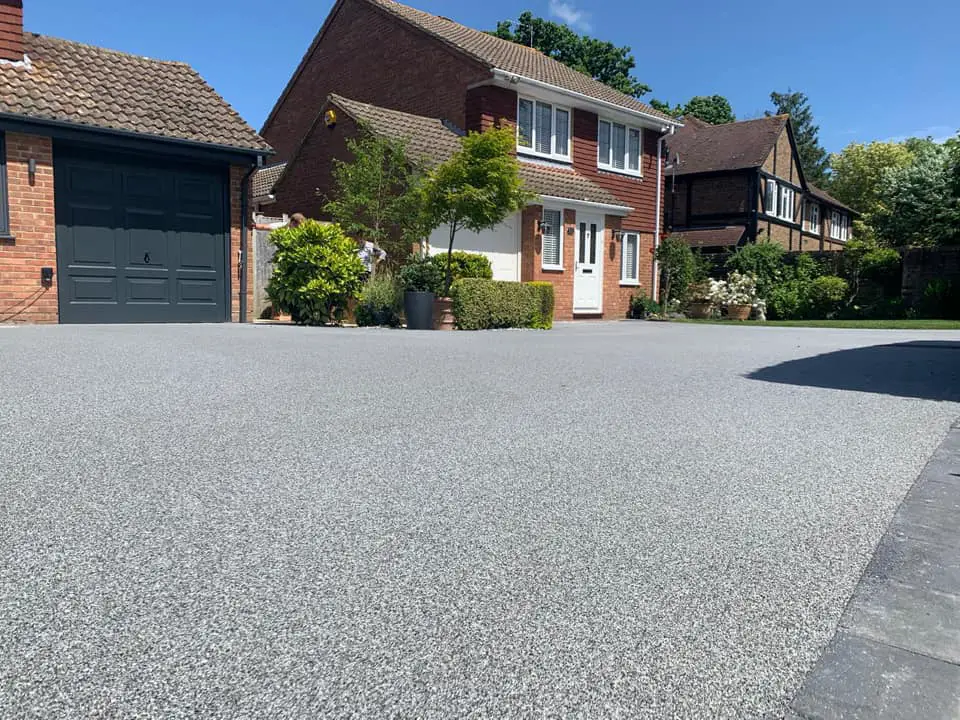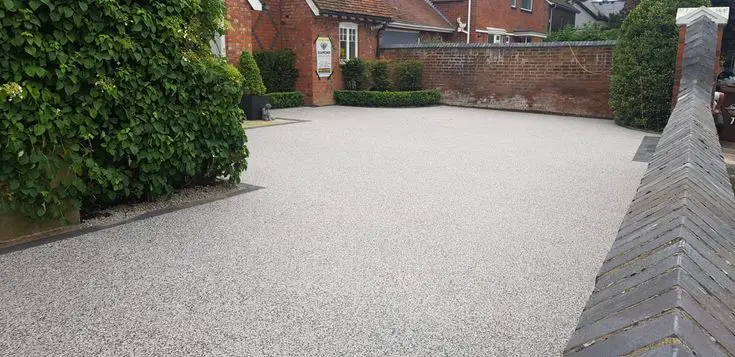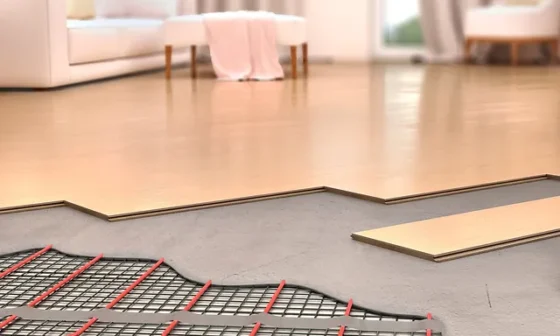
Resin driveways have gained popularity as an attractive and durable alternative to traditional driveway materials.
As a homeowner or property owner, you might be considering whether a resin driveway is the right choice for you.
Advantages of Resin Driveways
- Aesthetically Pleasing: Resin driveways offer a sleek and modern appearance that can instantly enhance the curb appeal of any property. The smooth, seamless finish creates an inviting entry to your home.
- Wide Range of Design Options: Resin driveways come in various colours and patterns, providing homeowners with the flexibility to customize their driveways to complement the overall aesthetics of their property.
- Durability: Resin driveways are highly durable and can withstand heavy vehicular traffic and adverse weather conditions common.
The materials used are resistant to cracking, fading, and oil stains, ensuring longevity.
- Low Maintenance: Once installed, resin driveways require minimal maintenance. Regular sweeping and occasional power washing are usually sufficient to keep them looking pristine.
- Permeable Surface: Resin driveways are permeable, allowing rainwater to pass through and be absorbed by the ground.
This eco-friendly feature helps prevent surface water runoff, reducing the risk of flooding.
- UV Resistant: High-quality resin materials used in driveways are UV-stable, ensuring that the vibrant colours do not fade over time, even when exposed to direct sunlight.
- Smooth Surface: Unlike traditional driveways with joints and gaps, resin driveways offer a smooth, even surface, which is wheelchair-friendly and reduces tripping hazards.
- Weed Resistant: Resin driveways inhibit weed growth, keeping your driveway free from unsightly weeds and reducing maintenance efforts.
- Non-Slip Surface: Resin driveways can be made slip-resistant, providing better traction for vehicles and pedestrians, especially during wet or icy conditions.
Disadvantages of Resin Driveways
- Initial Cost: The upfront cost of installing a resin driveway can be higher compared to other traditional materials. However, the long-term benefits often outweigh the initial investment.
- Professional Installation Required: Proper installation is crucial for the longevity and performance of a resin driveway. Hiring professional contractors is essential, which adds to the overall cost.
- Curing Time: After installation, resin driveways require sufficient curing time before they can handle heavy loads and traffic. This can cause temporary inconvenience.
- Staining: While resin driveways are generally oil-resistant, certain chemicals and substances can cause stains if not cleaned promptly.
- Potential Discoloration: Low-quality resin or improper installation may lead to discoloration over time, affecting the appearance of the driveway.
- Cracks and Damage: Despite their durability, resin driveways can still develop cracks over time due to ground movement or heavy loads.
- Difficult Repairs: Repairing damaged resin driveways can be a complex task, often requiring professional assistance and specialized equipment.
Block Paving Driveways VS Resin Driveways
| Aspect | Block Paving Driveways | Resin Driveways |
|---|---|---|
| Material | Interlocking concrete or clay blocks | Resin (a mixture of aggregate stones and binding resin) |
| Aesthetics | Wide variety of designs and patterns available | Smooth and modern appearance |
| Durability | Highly durable and can withstand heavy loads | Durable, but may be susceptible to cracks and fading |
| Maintenance | May require occasional re-sanding and sealing | Generally low maintenance, occasional cleaning required |
| Weed Growth | May experience weed growth between the blocks | Resistant to weed growth |
| Permeability | Semi-permeable, allows water to drain through joints | Permeable, provides good water drainage |
| Installation | Requires professional installation | Requires professional installation |
| Cost | Moderate cost, can vary depending on design and size | Can be more expensive than some other driveway options |
| Colour Options | Wide range of colours available | Limited colour options compared to other materials |
| Environmental Consideration | More eco-friendly, allows water to soak into the ground | Permeable surface promotes better water management |
When making a decision between resin driveways and block paving driveways, consider factors such as:
- Aesthetics: Which style complements the overall look of your property?
- Budget: Compare the costs of both options and see what fits your budget.
- Durability: Consider the expected level of traffic and usage on the driveway.
- Maintenance: Evaluate the amount of maintenance you’re willing to put in.
- Environmental Impact: Consider the environmental implications of your choice.
Ultimately, both options have their strengths, and the “better” choice depends on your specific requirements and preferences.
It’s advisable to consult with a professional driveway installer who can assess your property and provide personalized recommendations based on your needs.
Are resin driveways suitable for all climates?

Yes, resin driveways are suitable for various climates. They are designed to be weather-resistant and can withstand rain, snow, and temperature fluctuations.
How long does a resin driveway typically last?
With proper installation and maintenance, a resin driveway can last up to 20 years or more, making it a long-lasting investment.
Are resin driveways eco-friendly?
Yes, resin driveways are eco-friendly because of their permeable nature, which allows rainwater to seep into the ground rather than creating surface runoff.
Can I park heavy vehicles on a resin driveway?
Yes, resin driveways are designed to handle heavy vehicles, but it’s essential to ensure proper installation and curing time for optimal performance.



Comments are closed.